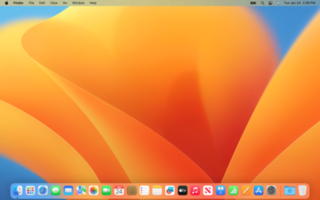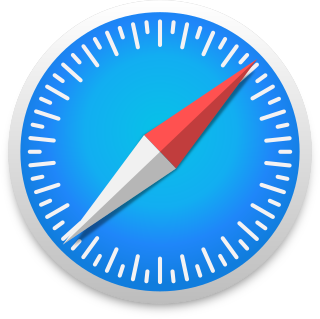
macOS is an operating system developed and marketed by Apple Inc. since 2001. It is the primary operating system for Apple's Mac computers. Within the market of desktop and laptop computers, it is the second most widely used desktop OS, after Microsoft Windows and ahead of Linux.

Safari is a web browser developed by Apple. It is built into Apple's operating systems, including macOS, iOS, and iPadOS, and uses Apple's open-source browser engine WebKit, which was derived from KHTML.

Bonjour is Apple's implementation of zero-configuration networking (zeroconf), a group of technologies that includes service discovery, address assignment, and hostname resolution. Bonjour locates devices such as printers, other computers, and the services that those devices offer on a local network using multicast Domain Name System (mDNS) service records.

Maxthon is a freeware web browser, created by JeffChen in Singapore. It is available for Windows, macOS, Linux, and as Maxthon Mobile for Android, iOS, and Windows Phone 8. Since version 6, Maxthon is based on Chromium.
This is a comparison of both historical and current web browsers based on developer, engine, platform(s), releases, license, and cost.

Dashboard is a discontinued feature of Apple Inc.'s macOS operating systems, used as a secondary desktop for hosting mini-applications known as widgets. These are intended to be simple applications that do not take time to launch. Dashboard applications supplied with macOS included a stock ticker, weather report, calculator, and notepad; while users could create or download their own.

iWork is an office suite of applications created by Apple for its macOS, iPadOS, and iOS operating systems, and also available cross-platform through the iCloud website.

Mac OS X Leopard is the sixth major release of macOS, Apple's desktop and server operating system for Macintosh computers. Leopard was released on October 26, 2007 as the successor of Mac OS X 10.4 Tiger, and is available in two editions: a desktop version suitable for personal computers, and a server version, Mac OS X Server. It retailed for $129 for the desktop version and $499 for Server. Leopard was superseded by Snow Leopard in 2009. Leopard is the final version of macOS to support the PowerPC architecture as Snow Leopard functions solely on Intel based Macs.

Dashcode was a software application created by Apple Inc. that was included with Mac OS X Leopard and facilitates the development of widgets for Dashboard. It was first included on new MacBooks shipping around the time of May 24, 2006, as part of the Xcode developer tools.
Gears, formerly Google Gears, is discontinued utility software offered by Google to create more powerful web apps by adding offline storage and other additional features to web browsers. Released under the BSD license, Gears is free and open-source. Gears was conceived at a time when a comparable alternative was not available. However, Gears was discontinued in favor of the standardized HTML5 methods that eventually became prevalent.

Ovi by Nokia was the brand for Nokia's Internet services. The Ovi services could be used from a mobile device, computer or via the web. Nokia focused on five key service areas: Games, Maps, Media, Messaging and Music. Nokia's aim with Ovi was to include third party developers, such as operators and third-party services like Yahoo's Flickr photo site. With the announcement of Ovi Maps Player API, Nokia started to evolve their services into a platform, enabling third parties to make use of Nokia's Ovi services.

Mac OS X Snow Leopard is the seventh major release of macOS, Apple's desktop and server operating system for Macintosh computers.
MobileMe is a discontinued subscription-based collection of online services and software offered by Apple Inc. All services were gradually transitioned to and eventually replaced by the free iCloud, and MobileMe ceased on June 30, 2012, with transfers to iCloud being available until July 31, 2012, or data being available for download until that date, when the site finally closed completely. On that date all data was deleted, and email addresses of accounts not transferred to iCloud were marked as unused.

Google Chrome is a cross-platform web browser developed by Google. It was first released in 2008 for Microsoft Windows, built with free software components from Apple WebKit and Mozilla Firefox. Versions were later released for Linux, macOS, iOS, and also for Android, where it is the default browser. The browser is also the main component of ChromeOS, where it serves as the platform for web applications.
SIMBL, is a discontinued application enhancement loader for Mac OS X developed by Mike Solomon. It helps third-party developers modify and add functionality to applications developed with the Cocoa environment without access to the source code. SIMBL loads code via the InputManager system, which was developed to support foreign input methods. Plugins using SIMBL have advantages over normal InputManager modifications such as targeted code loading into specific applications. Designed for Solomon's PithHelmet, SIMBL is now used by other developers. The most popular use of SIMBL is to add functionality to the Apple Safari web browser which did not have an Apple-authorized plugin system until version 5 in 2010.
Google Quick Search Box (GQSB) is an application launcher and desktop search tool developed by Google for Mac OS X computers. It allows users to search files, URLs, and contacts on their computer, as well as performing actions on the results.
This is a comparison on mobile operating systems. Only the latest versions are shown in the table below, even though older versions may still be marketed.

macOS Sierra is the thirteenth major release of macOS, Apple Inc.'s desktop and server operating system for Macintosh computers. The name "macOS" stems from the intention to unify the operating system's name with that of iOS, iPadOS, watchOS and tvOS. Sierra is named after the Sierra Nevada mountain range in California and Nevada. Its major new features concern Continuity, iCloud, and windowing, as well as support for Apple Pay and Siri.

Pre-installed iOS apps, referred to in the App Store as 'Built-In Apps', are a suite of mobile applications developed by Apple Inc. which are bundled with iOS and installed by default or through a system update. Many of the default apps found on iOS have counterparts on Apple's other operating systems macOS, iPadOS, watchOS, and tvOS, which are often modified versions of or similar to the iOS application. As each app is integrated into the operating system itself, they often feature greater support for system features than third-party alternatives and are quick to adapt new features of iOS.











